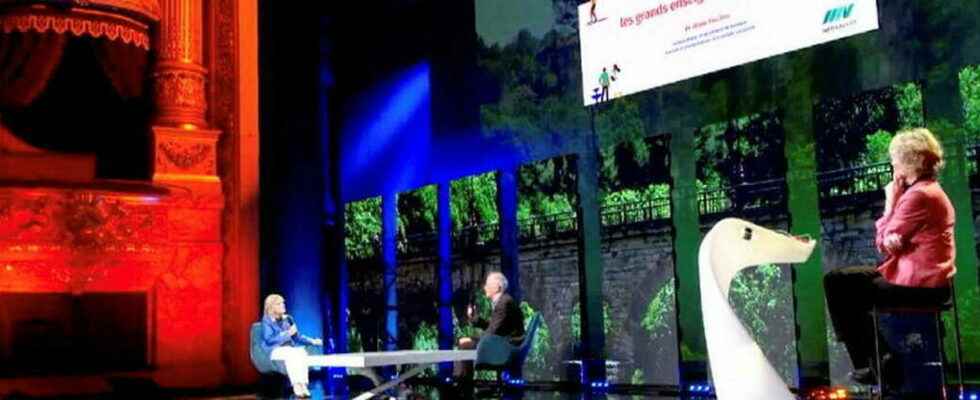How to preserve your health? How to find her? And to what extent can we really be masters of it? These key questions are at the heart of the sixth edition of our annual Futurapolis Santé meeting, which is being held on October 7 and 8 at the Opéra Comédie in Montpellier and where entrepreneurs, major health players and renowned researchers meet you to answer it. On the program: local medicine, personalized care pathway, physical activity, digital… But also expert advice to ensure your longevity… in good health!
Find all the conferences of the event here as well as on our social networks (Facebook, TwitterDailymotion).
5:05 p.m. – See you tomorrow !
Thank you for following this first day of debates and round tables!
See you tomorrow, from 10 a.m., for the second part of the event.
An eclectic poster awaits you. On the program: rare diseases, computer hacking, skin microbiome and…cancer-sniffing dogs.
5:16 p.m. – A definition of innovation
“Innovation is permanent adaptation, according to Thomas Le Ludec, director of Montpellier University Hospital. It’s constantly asking questions: how do we get out of the frame, how do we get out of the routine? This is the role of all professionals. An American pediatrician once said: “We have two jobs: that of your specialty and improving your job, that of innovation!” »
4:50 p.m. – The hospital, this incredible place of innovation
Currently only 20% of hospitals, mainly university hospitals, have relationships with innovative companies. This is explained by their complexity, the diversity of their interlocutors and their strong inertia. But things are changing, especially in centers that have set up a team dedicated to innovation that is independent of the clinical research department. Examples with the Hospi’Up program of the Research & Innovation Fund of the French Hospital Federation and the innovation extractor set up within the Montpellier University Hospital, the aim of which is to facilitate and open up the field of possibilities for all the promoters of hospital projects. Attention inventors!
With Enguerrand HabranDirector of the Research and Innovation Fund of the French Hospital Federation, and Thomas Le Ludecdirector of Montpellier University Hospital.
4:38 p.m. – Deaths and air pollution
The doctor Gregoire Mercier, from the Health Data Science Unit of the Public Health Service at the Montpellier University Hospital, sounds the alarm: “The environment has an impact on human health, and vice versa! Air pollution, for example, is responsible for 8% of all deaths in Montpellier. This figure has tended to decrease but remains considerable…”
4:32 p.m. – Health: composite portrait of Montpellier residents
What about local health? “It is a relatively young population compared to other departments and cities, less exposed to certain chronic diseases (especially cardiovascular and respiratory) but crossed by significant socio-economic disparities and exposed to dangers or environmental factors” , exposes Dr. Gregoire Mercier from the Health Data Science Unit of the Public Health Service at Montpellier University Hospital.
4:00 p.m. – Montpellier, global health laboratory
Global health – a multidisciplinary approach that integrates all the behavioural, environmental and other elements likely to influence our body – is a priority for Montpellier. A city of excellence and a pilot city at national or even European level, the metropolis is multiplying local actions, for example with the opening of several health centres. MedVallée translates well this ambitious dynamic which aims to forget no one or any element of what can contribute to the health of the population, to health democracy. Examples with oral health (without which it is impossible to chew and therefore to eat), mental health (damaged by the Covid-19 epidemic and confinements) and help for the elderly, always more numerous.
With Elodie Brun-Mandonmunicipal councilor of Montpellier in charge of the prevention of addictions, Gregoire MercierHealth Data Science Unit, Montpellier University Hospital Public Health Department, Nicolas Giraudeaupractitioner at the CHU, president of the foundation of the University of Montpellier and coordinator of the Montpellier oral health program, and Nicolas Rainteaupsychiatrist at the Center for Recovery and Rehabilitation Jean Minvielle, University Hospital of Montpellier.
3:55 p.m. – Cancer: the place of the “human”
“The patient is not just a tumour, it’s not just a mutated gene, it’s a person as a whole, in their ecosystem. And the role of the coordination nurse is to assess their overall needs: their caregivers, their history, their perception of the disease which will be different from one person to another, ”recalls the Prof. Marc Ychoupu-ph specialist in digestive oncology and director of the Cancer Research Institute of Montpellier.
3:38 p.m. – Cancer: complex treatment
“Multidisciplinarity is essential in the treatment of cancer but creates difficulties for the patient to find his way through his journey. And there are several types of journey: the one before entering care; admission to a cancer institute, public hospital; finally and it is not the easiest, the return home”, explains the professor Marc Ychouuniversity professor and hospital practitioner specializing in digestive oncology and director of the Cancer Research Institute of Montpellier.
3:15 p.m. – Cancer: never let go of the patient’s hand
One in five men and one in six women will develop cancer in their lifetime. This disease, the treatment of which is sometimes spread over many years, involves comprehensive management, as soon as it is diagnosed. This requires organizing an individual “patient journey”, adapted to the pathology, the general condition of the patient, the various therapies to which he must submit (and also the side effects he is likely to experience), his specific needs and their family, medical and geographic environment. This also involves improving their lifestyle, in particular helping them to maintain or resume physical activity, as well as adjusting their professional activity. Only a multidisciplinary team can meet all these challenges…
With Jean-Baptiste Mericdirector of the public health and healthcare division of INCa, Annelys Nielcare coordination nurse at the ICM in Montpellier, Marc YchouPUPH specialist in digestive oncology and director of the cancer research institute of Montpellier and Nathalie Marinerelay nurse, State graduate IUD expert in urology.
